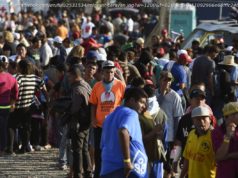Carles Puigdemont, the deposed Catalan leader, arrived amid speculation that he may seek asylum or try to form a government in exile
BARCELONA, Spain — Hours after the Spanish authorities announced that they would seek to prosecute Catalonia’s separatists for rebellion, Carles Puigdemont, the region’s dismissed leader, turned up on Monday in Belgium, where he may seek asylum.
Mr. Puigdemont’s reputation for unpredictability has grown with every turn of Catalonia’s secessionist drama. On Monday, he all but disappeared as the Madrid central government began using emergency laws to take over direct administration of Catalonia after its declaration of independence last week.
Speculation had mounted as to what he was up to over the course of the day, until a lawyer in Belgium finally ended the mystery surrounding Mr. Puigdemont’s whereabouts late Monday.
“I have been consulted by Puigdemont and he asked me to protect his interests in the future in Belgium,” said Paul Bekaert, a Flemish lawyer.
Mr. Bekaert said the two men had met in Belgium and that the conversation was “about what possibly could come, whatever the Spanish government has ready for him.”
Mr. Bekaert emphasized his “more than 30 years of experience with extradition and political asylum” cases, including with Basques who advocated for separation from Spain.
Belgium is virtually the only national government in Europe that has been even remotely sympathetic to Mr. Puigdemont’s pleas for mediation, not least perhaps because the country has faced separatist tensions of its own led by Flemish hard-liners.
Awkwardly, Brussels is also the headquarters of a European Union bureaucracy that has held the Catalan secessionists at arms’ length, for fear of upsetting Spain, one of the bloc’s largest member states, and stoking forces of fragmentation in other parts of the Continent.
On Monday, while there was no official confirmation that Mr. Puigdemont had gone to Brussels, the Belgian and Spanish news media variously suggested that he had arrived for consultations, to seek political asylum, or to even declare a Catalan “government in exile.”
The speculation kicked into high gear not long after Spain’s attorney general, José Manuel Maza, called around noon in Madrid for the prosecution of Mr. Puigdemont and another 19 Catalan politicians, stopping short of ordering their immediate arrest.
Mr. Maza said he wanted them Catalan politicians to appear “urgently” in court in Madrid. A decision would be left to Spanish judges whether to charge or jail them. The politicians could face 30 years in prison for the most serious of the potential charges, which included rebellion and sedition.
Officially, the Belgian government said they had no knowledge of Mr. Puigdemont’s presence in their country.
But the statements of some officials seemed to hint at an openness to accepting Mr. Puigdemont and other Catalan officials if they chose exile.
“It is not unrealistic, if you see the situation at this moment, and the repression from Madrid and the prison sentences with which they are threatening, that the question is whether such a person still has a chance to a fair trial of course,” Belgium’s migration minister, Theo Francken, told VTM News, a Belgian television station, over the weekend.
“That’s where we enter into a difficult diplomatic situation with the Spanish government,” he added.
Mr. Francken is a member of the New Flemish Alliance party, which favors Flemish independence from the rest of Belgium and has historically had strong links to the Catalan separatists as a kindred movement. Earlier this month, members of the alliance hung the Catalan independence flag — the Estelada —in the Belgian Parliament, in a gesture of support.
But Belgium’s prime minister, Charles Michel, has dismissed the possibility of granting asylum to Mr. Puigdemont, saying it “is absolutely not on the agenda” and called on Mr. Francken “not to fan the flames.”
Mr. Puigdemont’s arrival presents a direct challenge to Mr. Michel, a Federalist, who as the leader of a delicate government coalition, will have to keep separatists in his own government in check while trying to maintain good diplomatic relations with Spain.
Spanish media had reported that Mr. Puigdemont had left Catalonia with five other deposed members of his cabinet, by car to the southern French city of Marseille, and then by plane to Brussels.
Officials from Spanish Prime Minister Mariano Rajoy’s conservative Popular Party said their priority on Monday was to make sure Mr. Puigdemont did not try to stay in office, by insisting he remained leader of Catalonia, rather than worry about him escaping the country.
Fernando Martínez-Maíllo, a senior Popular Party official, characterized Mr. Puigdemont’s departure as “a desperate act.”
Albert Rivera, the leader of the Ciudadanos party, which is strongly opposed to secession, accused Mr. Puigdemont and his separatist leadership of “fleeing the country” while leaving his Catalan civil servants to resist and continue to break Spanish law.
Indeed, the forcible steps by the central government have now left Catalan civil servants and politicians with the painful choice of sticking to their secessionist plans and defying Madrid’s direct administration or facing the potential of criminal charges.
Not least, there was the important decision for separatist parties about whether to take part in regional elections called by Madrid or to risk sidelining themselves.
The two main Catalan parties — including Mr. Puigdemont’s Catalan European Democratic Party — said on Monday they would run in the elections, which are scheduled for Dec. 21, although perhaps no longer as part of the coalition that won the most parliamentary seats in 2015.
Germà Bel, a separatist Catalan lawmaker, said Mr. Puigdemont’s possible hopes of running a government from exile was “symbolic.”
“I don’t know of anyone who’s run a government from overseas,” he said. “Even Charles de Gaulle didn’t run a government from overseas.”
But he argued that it would be hard for Mr. Rajoy’s government to maintain control over Catalonia for an extended period.
The decision by pro-independence parties to take part in the December elections meant that they “at least implicitly” accept they are still part of Spain — no small concession.
“This election has been called by the Spanish government under Spanish law — and it will be an election run within the state,” Mr. Bel said.
With the emergency measures taken over the weekend, Mr. Rajoy opted not to appoint a caretaker leader of Catalonia.
Instead, the country’s deputy prime minister, Soraya Sáenz de Santamaría, took over the management of the Catalan administration from Madrid, and dispatched a senior central government official to Barcelona on Monday.
Home
United States
USA — Political Catalonia Leader Turns Up in Belgium After Spain Seeks Prosecution






